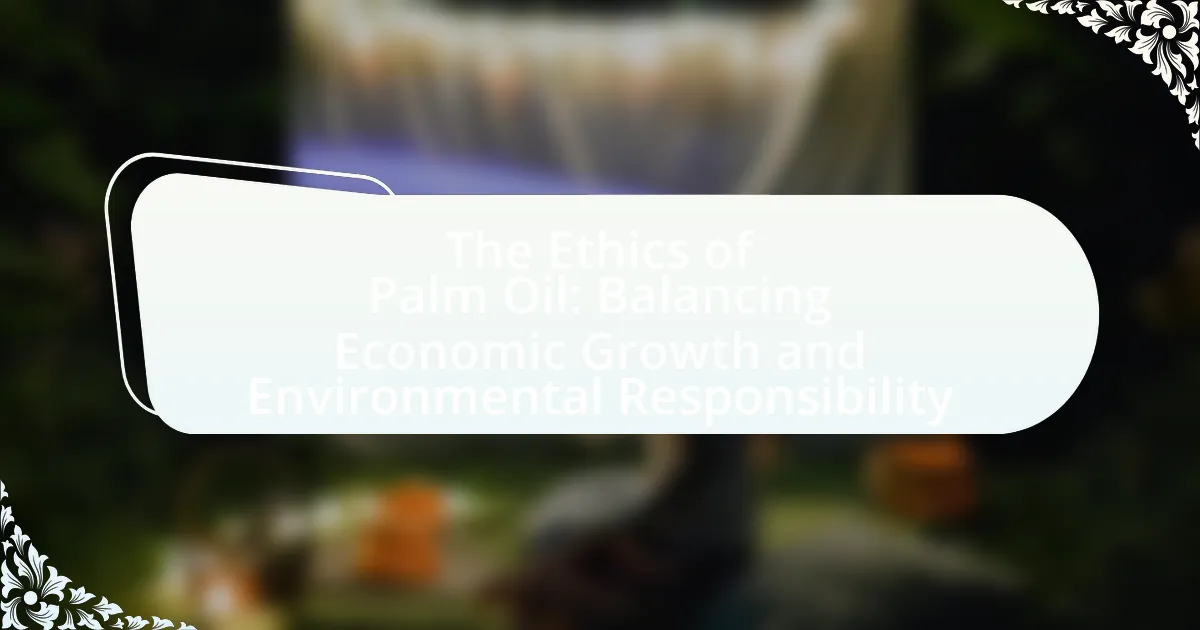The article examines the ethical considerations surrounding palm oil production, focusing on the environmental degradation, human rights violations, and economic impacts associated with the industry. It highlights the significant role of palm oil in local economies, particularly in Indonesia and Malaysia, where it provides employment and contributes to GDP. However, the article also addresses the environmental issues linked to palm oil cultivation, such as deforestation and biodiversity loss, as well as the social implications, including labor exploitation and displacement of indigenous communities. Furthermore, it explores sustainable practices and consumer choices that can promote ethical palm oil production, emphasizing the need for a balance between economic growth and environmental responsibility.

What are the ethical considerations surrounding palm oil production?
The ethical considerations surrounding palm oil production primarily involve environmental degradation, human rights violations, and economic impacts. Deforestation for palm oil plantations leads to loss of biodiversity and contributes to climate change, with approximately 90% of deforestation in Indonesia attributed to palm oil expansion. Additionally, labor practices in the industry often involve exploitation, including child labor and unsafe working conditions, affecting local communities. Furthermore, the economic benefits of palm oil production can be overshadowed by the long-term environmental costs and social injustices, raising questions about sustainability and corporate responsibility.
How does palm oil production impact local economies?
Palm oil production significantly impacts local economies by providing employment opportunities and generating income for farmers and workers. In countries like Indonesia and Malaysia, the palm oil industry employs millions, with estimates suggesting that around 4.5 million people are directly involved in palm oil cultivation and processing. This sector contributes to local economies through increased agricultural productivity and export revenues, with palm oil being one of the largest agricultural exports for these nations, generating billions in foreign exchange. Additionally, smallholder farmers benefit from the cultivation of palm oil, as they often rely on it as a primary source of income, which can improve their living standards and access to education and healthcare.
What are the economic benefits of palm oil for producing countries?
The economic benefits of palm oil for producing countries include significant contributions to GDP, job creation, and export revenues. For instance, in Indonesia and Malaysia, which together account for approximately 85% of global palm oil production, the industry contributes billions of dollars to their economies annually. In 2020, palm oil exports from Indonesia alone were valued at around $18 billion, highlighting its role as a vital economic driver. Additionally, the palm oil sector provides employment for millions, with estimates suggesting that over 4 million people in Indonesia depend on the industry for their livelihoods. This economic impact underscores the importance of palm oil in fostering growth and development in producing nations.
How does palm oil production affect employment opportunities in rural areas?
Palm oil production significantly increases employment opportunities in rural areas by creating jobs in cultivation, processing, and distribution. The expansion of palm oil plantations often leads to the hiring of local labor, which can reduce unemployment rates and provide income for families. For instance, a study by the World Bank indicated that palm oil cultivation can generate up to 1.5 million jobs in Indonesia alone, highlighting its role as a major economic driver in rural communities. Additionally, the sector often supports ancillary industries, further enhancing job creation and economic stability in these regions.
What environmental issues are associated with palm oil cultivation?
Palm oil cultivation is associated with significant environmental issues, primarily deforestation, loss of biodiversity, and greenhouse gas emissions. Deforestation occurs as vast areas of tropical forests are cleared to make way for palm oil plantations, leading to habitat destruction for numerous species, including endangered ones like orangutans and tigers. According to the World Wildlife Fund, approximately 50% of the world’s palm oil is produced in Indonesia and Malaysia, where deforestation rates have been alarmingly high. Additionally, the conversion of forests to plantations releases stored carbon dioxide, contributing to climate change; studies indicate that palm oil production is responsible for about 10% of global deforestation. Furthermore, monoculture practices in palm oil farming reduce soil fertility and increase vulnerability to pests, further exacerbating environmental degradation.
How does deforestation for palm oil affect biodiversity?
Deforestation for palm oil significantly reduces biodiversity by destroying habitats essential for various species. This land conversion leads to the loss of flora and fauna, with estimates indicating that palm oil plantations can result in a decline of up to 90% in local species richness. For instance, the expansion of palm oil cultivation in Southeast Asia has been linked to the endangerment of species such as orangutans and tigers, as their natural habitats are cleared for monoculture farming. Additionally, the fragmentation of ecosystems disrupts food chains and breeding grounds, further threatening biodiversity.
What role does palm oil play in climate change?
Palm oil significantly contributes to climate change primarily through deforestation and greenhouse gas emissions. The cultivation of palm oil often leads to the clearing of tropical forests, which are vital carbon sinks. According to a study published in the journal “Nature Climate Change,” land-use changes associated with palm oil production can release up to 1.5 billion tons of carbon dioxide annually. This deforestation not only increases atmospheric CO2 levels but also disrupts biodiversity and local ecosystems, further exacerbating climate-related issues.
What are the social implications of palm oil production?
The social implications of palm oil production include displacement of indigenous communities, labor exploitation, and health issues related to environmental degradation. Displacement occurs as land is cleared for plantations, often without proper compensation or consent from local populations, leading to loss of livelihoods and cultural heritage. Labor exploitation is prevalent, with reports of poor working conditions, low wages, and child labor in some regions. Additionally, the environmental degradation caused by deforestation and monoculture practices can result in health problems for nearby communities, including respiratory issues from air pollution and water contamination. These factors highlight the complex social challenges associated with palm oil production, necessitating a balance between economic growth and ethical considerations.
How does palm oil cultivation affect indigenous communities?
Palm oil cultivation negatively affects indigenous communities by leading to land dispossession and loss of traditional livelihoods. As palm oil plantations expand, they often encroach on ancestral lands, displacing communities and disrupting their cultural practices. For instance, a study by the Forest Peoples Programme highlights that in Indonesia, over 1.5 million hectares of land have been converted to palm oil plantations, impacting the rights and resources of local indigenous populations. Additionally, the economic benefits of palm oil production frequently do not reach these communities, as profits are typically concentrated among large corporations, exacerbating social inequalities.
What are the labor rights issues in the palm oil industry?
Labor rights issues in the palm oil industry include forced labor, child labor, inadequate wages, and unsafe working conditions. Reports from organizations such as Human Rights Watch and the International Labour Organization indicate that many workers face exploitation, with some being subjected to long hours without proper compensation or safety measures. For instance, a 2020 report highlighted that in Indonesia and Malaysia, a significant percentage of palm oil workers earn below the minimum wage and lack access to basic health services, which violates their rights as laborers.

How can we balance economic growth with environmental responsibility in palm oil production?
To balance economic growth with environmental responsibility in palm oil production, implementing sustainable agricultural practices is essential. These practices include adopting agroforestry techniques, which integrate palm oil cultivation with other crops, thereby enhancing biodiversity and reducing deforestation. Research indicates that sustainable palm oil production can yield up to 30% more profit per hectare compared to conventional methods, as shown in studies by the Roundtable on Sustainable Palm Oil (RSPO). Additionally, certification schemes like RSPO promote environmentally friendly practices, ensuring that palm oil is produced without harming ecosystems, which can attract eco-conscious consumers and open new markets. By prioritizing sustainability, the palm oil industry can achieve economic growth while preserving environmental integrity.
What sustainable practices can be implemented in palm oil farming?
Sustainable practices in palm oil farming include implementing agroforestry, utilizing cover crops, and adhering to certification standards such as the Roundtable on Sustainable Palm Oil (RSPO). Agroforestry integrates palm oil cultivation with other crops and trees, enhancing biodiversity and soil health. Cover crops prevent soil erosion and improve nutrient retention, contributing to sustainable land management. Certification standards like RSPO ensure that palm oil is produced with minimal environmental impact, promoting responsible land use and social equity. These practices collectively help mitigate deforestation, protect wildlife habitats, and support local communities, aligning economic growth with environmental responsibility.
How does certification (e.g., RSPO) promote sustainable palm oil?
Certification, such as the Roundtable on Sustainable Palm Oil (RSPO), promotes sustainable palm oil by establishing clear standards that producers must meet to ensure environmentally responsible practices. These standards include criteria for protecting biodiversity, reducing greenhouse gas emissions, and respecting the rights of local communities. For instance, RSPO-certified producers are required to maintain high conservation value areas and implement measures to prevent deforestation. As of 2021, over 4.5 million hectares of palm oil plantations were RSPO certified, demonstrating a commitment to sustainability and responsible production methods. This certification process not only enhances transparency in the supply chain but also encourages consumers and companies to support sustainable palm oil, thereby driving market demand for responsibly sourced products.
What are the benefits of agroforestry in palm oil cultivation?
Agroforestry in palm oil cultivation enhances biodiversity, improves soil health, and increases economic resilience. By integrating trees with palm oil plantations, agroforestry creates habitats for various species, which can lead to improved pollination and pest control. Studies indicate that agroforestry systems can enhance soil fertility through organic matter addition and reduce erosion, thereby promoting sustainable land use. Additionally, farmers practicing agroforestry often experience diversified income sources, as they can harvest multiple products, which mitigates risks associated with market fluctuations in palm oil prices.
How can consumers influence ethical palm oil production?
Consumers can influence ethical palm oil production by choosing products certified by credible organizations, such as the Roundtable on Sustainable Palm Oil (RSPO). By purchasing certified products, consumers create demand for sustainably sourced palm oil, encouraging manufacturers to adopt ethical practices. In 2020, the RSPO reported that over 19 million metric tons of palm oil were certified sustainable, demonstrating a growing market for ethical palm oil driven by consumer choices. Additionally, consumers can advocate for transparency in supply chains and support brands that commit to ethical sourcing, further pressuring companies to prioritize sustainability in their palm oil procurement.
What role do consumer choices play in promoting sustainable palm oil?
Consumer choices significantly influence the promotion of sustainable palm oil by driving demand for ethically sourced products. When consumers prioritize products certified by organizations like the Roundtable on Sustainable Palm Oil (RSPO), they encourage manufacturers to adopt sustainable practices. For instance, a 2020 study indicated that 60% of consumers are willing to pay more for sustainably sourced palm oil, demonstrating a clear market preference that can lead to increased production of sustainable palm oil. This consumer behavior not only supports environmentally responsible farming practices but also pressures companies to improve their supply chains, ultimately contributing to the reduction of deforestation and habitat destruction associated with palm oil production.
How can awareness campaigns impact palm oil consumption patterns?
Awareness campaigns can significantly alter palm oil consumption patterns by educating consumers about the environmental and social impacts of palm oil production. These campaigns often highlight issues such as deforestation, habitat destruction, and human rights violations associated with unsustainable palm oil practices. For instance, a study by the World Wildlife Fund found that consumer awareness initiatives led to a 20% increase in the demand for sustainably sourced palm oil in regions where campaigns were implemented. By informing consumers and promoting alternatives, awareness campaigns can drive market demand towards sustainable practices, ultimately influencing producers to adopt more responsible methods.

What are the future prospects for ethical palm oil production?
The future prospects for ethical palm oil production are promising, driven by increasing consumer demand for sustainable products and regulatory pressures for environmentally responsible practices. As of 2023, initiatives like the Roundtable on Sustainable Palm Oil (RSPO) have established standards that promote sustainable cultivation, which can lead to greater market access and profitability for compliant producers. Additionally, research indicates that the global market for sustainable palm oil is expected to grow, with projections showing a potential increase in demand by 20% over the next five years. This growth is supported by rising awareness among consumers regarding deforestation and biodiversity loss associated with conventional palm oil production, prompting companies to adopt ethical sourcing policies.
How is technology shaping the future of palm oil sustainability?
Technology is significantly shaping the future of palm oil sustainability by enabling precision agriculture, improving traceability, and enhancing yield efficiency. Precision agriculture technologies, such as satellite imagery and drones, allow farmers to monitor crop health and optimize resource use, reducing environmental impact. For instance, the use of remote sensing can help identify areas needing intervention, minimizing pesticide and fertilizer use, which is crucial for sustainable practices.
Moreover, blockchain technology is being implemented to enhance traceability in the palm oil supply chain, ensuring that products are sourced sustainably and ethically. This transparency helps consumers make informed choices and encourages producers to adhere to sustainable practices. According to a report by the World Wildlife Fund, the adoption of these technologies can lead to a 30% reduction in greenhouse gas emissions from palm oil production by 2030.
Additionally, advancements in biotechnology are facilitating the development of higher-yielding palm oil varieties that require less land, further mitigating deforestation pressures. These innovations collectively contribute to a more sustainable palm oil industry, aligning economic growth with environmental responsibility.
What innovations are being developed to reduce the environmental impact of palm oil?
Innovations being developed to reduce the environmental impact of palm oil include the use of sustainable agricultural practices, alternative oil sources, and advanced technologies for monitoring and certification. Sustainable agricultural practices, such as agroforestry and intercropping, help maintain biodiversity and soil health while reducing deforestation. Alternative oil sources, like algae and genetically modified crops, are being explored to provide substitutes for palm oil without the associated environmental degradation. Additionally, technologies such as satellite monitoring and blockchain for supply chain transparency are being implemented to ensure compliance with sustainability standards and trace the origin of palm oil products. These innovations collectively aim to mitigate the ecological footprint of palm oil production while supporting economic growth.
How can data analytics improve transparency in the palm oil supply chain?
Data analytics can improve transparency in the palm oil supply chain by enabling real-time tracking of production processes and sourcing practices. By utilizing technologies such as blockchain and data visualization tools, stakeholders can access verified information about the origins of palm oil, including details on land use, deforestation rates, and compliance with sustainability standards. For instance, a study by the World Resources Institute found that companies using data analytics to monitor their supply chains can reduce the risk of sourcing from illegal or unsustainable sources by up to 50%. This enhanced visibility fosters accountability among producers and suppliers, ultimately promoting ethical practices within the industry.
What policies are needed to support ethical palm oil production?
Policies needed to support ethical palm oil production include stringent sustainability certification standards, enforcement of land-use regulations, and promotion of transparency in supply chains. Sustainability certification standards, such as those established by the Roundtable on Sustainable Palm Oil (RSPO), ensure that palm oil is produced without deforestation, peatland destruction, or harm to biodiversity. Enforcement of land-use regulations prevents illegal land clearing and promotes responsible agricultural practices. Additionally, promoting transparency in supply chains allows consumers and businesses to make informed choices, thereby encouraging producers to adhere to ethical practices. These policies collectively contribute to a more sustainable palm oil industry, balancing economic growth with environmental responsibility.
How can governments enforce regulations on palm oil production?
Governments can enforce regulations on palm oil production through a combination of legal frameworks, monitoring systems, and incentives for sustainable practices. Legal frameworks can include laws that set environmental standards, land use regulations, and penalties for non-compliance, which are essential for holding producers accountable. Monitoring systems, such as satellite imagery and on-the-ground inspections, enable governments to track deforestation and land conversion associated with palm oil cultivation. Additionally, governments can implement incentives, such as subsidies for sustainable farming practices or certification programs, to encourage producers to adopt environmentally responsible methods. For instance, the Roundtable on Sustainable Palm Oil (RSPO) certification promotes sustainable practices and can be supported by government policies to enhance compliance.
What international agreements can promote sustainable palm oil practices?
International agreements that can promote sustainable palm oil practices include the Roundtable on Sustainable Palm Oil (RSPO), the Convention on Biological Diversity (CBD), and the Paris Agreement. The RSPO establishes criteria for sustainable palm oil production, aiming to minimize environmental impact and enhance social responsibility. The CBD encourages the conservation of biodiversity, which is crucial for maintaining ecosystems affected by palm oil cultivation. The Paris Agreement focuses on climate change mitigation, indirectly supporting sustainable practices by promoting reduced deforestation and greenhouse gas emissions associated with palm oil production. These agreements collectively foster a framework for sustainable practices in the palm oil industry.
What practical steps can consumers take to support ethical palm oil production?
Consumers can support ethical palm oil production by choosing products certified by recognized sustainability standards, such as the Roundtable on Sustainable Palm Oil (RSPO). By purchasing RSPO-certified products, consumers directly contribute to practices that minimize deforestation, protect biodiversity, and uphold fair labor standards. In 2020, RSPO reported that over 19 million metric tons of palm oil were produced sustainably, demonstrating the impact of consumer choices on promoting responsible production methods. Additionally, consumers can educate themselves about brands’ sourcing practices and advocate for transparency in supply chains, further encouraging companies to adopt ethical palm oil sourcing.

Leave a Reply